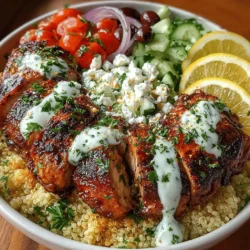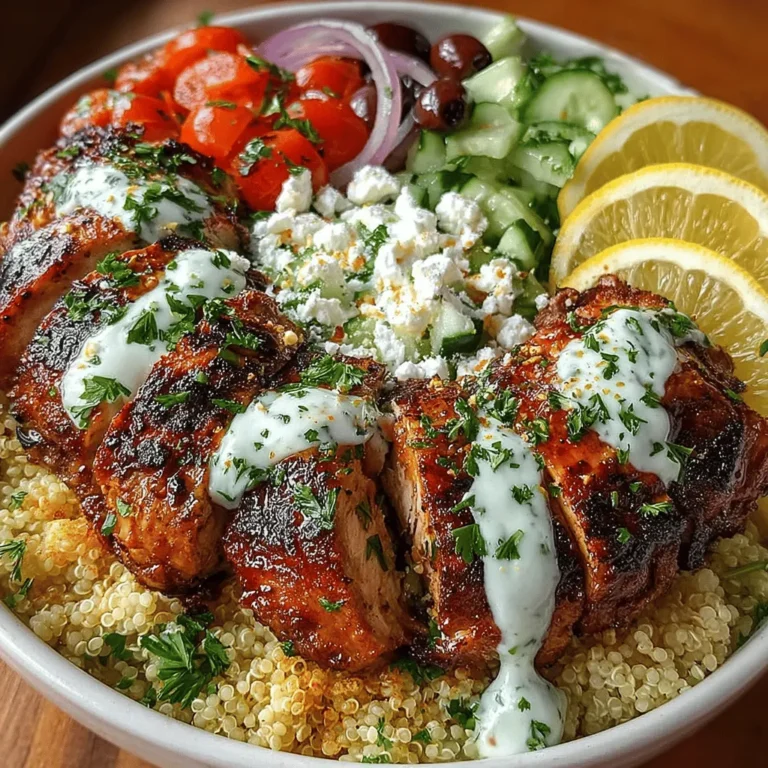Mediterranean Grilled Chicken Bowls: A Wholesome Meal Option
Mediterranean cuisine is celebrated for its vibrant flavors and health benefits, making it a favorite among food enthusiasts and nutritionists alike. Rooted in the culinary traditions of countries bordering the Mediterranean Sea, this cuisine emphasizes the use of fresh, seasonal ingredients, healthy fats, and a variety of grains, fruits, and vegetables. Known for its heart-healthy benefits, Mediterranean cuisine has been linked to reduced risks of chronic diseases such as heart disease and diabetes, owing to its focus on whole foods and balanced nutrition.
Among the plethora of dishes that this region offers, Mediterranean Grilled Chicken Bowls stand out as a convenient and satisfying meal option. These bowls are not only visually appealing but also provide a well-rounded combination of protein, grains, and fresh vegetables, making them perfect for lunch or dinner. By incorporating grilled chicken, a nutritious grain base, and an array of colorful toppings, this dish showcases the essence of Mediterranean cooking while catering to modern dietary needs.
Understanding the Ingredients
To create a delicious and nutritious Mediterranean Grilled Chicken Bowl, understanding the key ingredients is essential. Each component plays a vital role in enhancing flavor, texture, and nutritional value.
1. Boneless, Skinless Chicken Thighs: The choice of chicken is crucial, and boneless, skinless chicken thighs are the ideal option for this dish. Unlike chicken breasts, thighs are more flavorful and retain moisture better during the grilling process, creating a succulent and tender protein base for the bowl.
2. Olive Oil and Lemon Juice: The marinade for the chicken integrates olive oil and fresh lemon juice, both of which are staples in Mediterranean cooking. Olive oil is renowned for its healthy monounsaturated fats and antioxidants, contributing richness to the dish. Meanwhile, lemon juice adds acidity and brightness, while also helping to tenderize the chicken, ensuring it remains juicy after grilling.
3. Grain Base – Quinoa or Brown Rice: The choice of grain is another crucial element. Quinoa and brown rice are both nutritious options that provide fiber, vitamins, and minerals. Quinoa, a complete protein, is gluten-free and cooks quickly, while brown rice is a whole grain that offers a chewier texture and nutty flavor. Both serve as a hearty foundation for the grilled chicken and toppings.
4. Fresh Vegetables: A colorful array of toppings can elevate the Mediterranean Grilled Chicken Bowl. Cherry tomatoes add sweetness, cucumbers provide crunch, red onions offer a sharp bite, and Kalamata olives introduce a briny flavor. Additionally, crumbled feta cheese contributes creaminess and a tangy finish, further enhancing the dish’s flavor profile.
5. Yogurt-Tahini Dressing: The finishing touch is the yogurt-tahini dressing, which not only adds creaminess but also boosts the nutritional value. Made from yogurt, tahini (a paste made from sesame seeds), garlic, and lemon juice, this dressing is rich in protein, healthy fats, and flavor, tying all the elements of the bowl together.
The Chicken Marinade: A Flavorful Base
Creating the perfect Mediterranean Grilled Chicken Bowl starts with a flavorful marinade. The marinade is a crucial step that infuses the chicken with taste and ensures it remains moist during cooking. Here’s a detailed look at the marinade ingredients and their contributions:
– Olive Oil: As a primary ingredient, olive oil not only enhances the flavor but also helps to lock in moisture. Packed with antioxidants and heart-healthy fats, it contributes to the overall well-being associated with Mediterranean diets.
– Fresh Lemon Juice: The acidity from fresh lemon juice is essential for brightening the flavors of the chicken. It also works as a natural tenderizer, breaking down protein fibers and making the chicken more succulent.
– Garlic and Herbs: Aromatic garlic adds depth of flavor, while fresh herbs like oregano, thyme, or rosemary bring an authentic Mediterranean touch. These herbs not only enhance the taste but also offer various health benefits, including anti-inflammatory properties.
Step-by-Step Guide to Marinating Chicken:
1. Prepare the Marinade: In a mixing bowl, combine approximately 1/4 cup of olive oil, the juice of one lemon, 2-3 minced garlic cloves, and a generous sprinkle of your choice of herbs (about 1 tablespoon of each herb). Whisk the ingredients together until well blended.
2. Prepare the Chicken: Trim any excess fat from the boneless, skinless chicken thighs and place them in a resealable plastic bag or a shallow dish.
3. Marinate: Pour the marinade over the chicken, ensuring all pieces are well coated. Seal the bag or cover the dish, and place it in the refrigerator to marinate.
4. Marination Time: For optimal flavor absorption, allow the chicken to marinate for at least 30 minutes to 2 hours. If time permits, marinating overnight can deepen the flavors even further.
Preparing the Grain Base
Once the chicken is marinated, the next step is to prepare the grain base. Choosing between quinoa and brown rice can depend on personal preference and dietary needs. Here’s how to prepare both:
Cooking Quinoa:
1. Rinse the Quinoa: Start by rinsing 1 cup of quinoa under cold water to remove any bitterness from its outer coating, known as saponin.
2. Cook: In a medium saucepan, combine the rinsed quinoa with 2 cups of water or broth for added flavor. Bring to a boil over medium-high heat.
3. Simmer: Once boiling, reduce the heat to low, cover, and let it simmer for about 15 minutes or until the quinoa has absorbed all the liquid.
4. Fluff: Remove from heat and let it sit covered for another 5 minutes. Fluff the quinoa with a fork before serving.
Cooking Brown Rice:
1. Rinse the Rice: Rinse 1 cup of brown rice under cold water to remove excess starch.
2. Cook: In a medium saucepan, combine the rinsed rice with 2 1/2 cups of water or broth. Bring to a boil.
3. Simmer: Once boiling, reduce the heat to low, cover, and allow it to simmer for about 40-45 minutes or until the rice is tender and the liquid is absorbed.
4. Rest: After cooking, let it sit covered for 10 minutes before fluffing with a fork.
Texture Differences: Quinoa has a light, fluffy texture and a slightly nutty flavor, whereas brown rice has a chewier texture and a more robust, earthy taste. Both offer unique qualities to the Mediterranean Grilled Chicken Bowls, allowing for personalization based on preference.
With the chicken marinated and the grain base prepared, you are well on your way to creating a delicious Mediterranean Grilled Chicken Bowl. The next steps will involve grilling the chicken to perfection and assembling the bowl with fresh toppings and a creamy dressing, making this dish a wholesome meal that is as nutritious as it is delicious.
{{image_2}}
The Role of Broth Versus Water for Added Flavor
When preparing your Mediterranean Grilled Chicken Bowls, the choice between using broth or water is crucial for infusing depth and richness into your dish. While water is a neutral base, broth—whether chicken, vegetable, or bone broth—adds layers of flavor that elevate your meal from ordinary to extraordinary. Broth not only enhances the taste but also contributes additional nutrients, making your bowls more satisfying. Opting for low-sodium broth allows you to control salt levels while still enjoying that savory punch.
Crafting the Yogurt-Tahini Dressing
Breakdown of the Dressing Ingredients and Their Health Benefits
The Yogurt-Tahini Dressing is the star of the Mediterranean Grilled Chicken Bowls, offering a creamy texture and a burst of flavor. Here’s a closer look at the key ingredients:
– Greek Yogurt: This ingredient is celebrated for its high protein content, making it a perfect addition for those looking to boost their protein intake. Additionally, Greek yogurt is packed with probiotics, which support gut health and digestion.
– Tahini: Made from ground sesame seeds, tahini is rich in healthy fats, including omega-3 and omega-6 fatty acids. It’s also a good source of calcium and various vitamins, making it a nutrient-dense option.
Instructions on Mixing the Dressing
To create your Yogurt-Tahini Dressing, follow these simple steps:
1. Combine Ingredients: In a medium-sized bowl, mix together 1 cup of Greek yogurt, 2 tablespoons of tahini, 1 tablespoon of lemon juice, and 1-2 cloves of minced garlic (adjust to taste).
2. Add Seasoning: Season with salt and pepper to taste. You can also add a pinch of cayenne or smoked paprika for a hint of heat.
3. Blend until Smooth: Use a whisk to combine the ingredients until you achieve a smooth consistency. If the dressing is too thick, add a little water or more lemon juice, one teaspoon at a time, until you reach your desired consistency.
Suggestions for Variations or Substitutions for the Dressing
Feel free to customize your dressing! You can swap Greek yogurt for dairy-free yogurt to cater to vegan diets. For a nut-free option, you can use sunflower seed butter instead of tahini. Experiment with herbs like dill or parsley for a fresh twist, or add a splash of balsamic vinegar for a tangy flavor.
Grilling the Chicken: Achieving Perfection
Importance of Preheating the Grill and Cooking Methods
Before you start grilling, preheating your grill is essential. This step ensures that your chicken thighs cook evenly, develop a beautiful char, and maintain their juiciness. Aim for a medium-high heat setting. If using a charcoal grill, let the coals burn down until they’re covered in white ash; for gas grills, allow about 10-15 minutes of preheating.
Step-by-Step Grilling Instructions for Chicken Thighs
1. Prepare the Chicken: Remove the marinated chicken thighs from the refrigerator and let them sit at room temperature for about 15 minutes. This helps them cook evenly.
2. Oil the Grill Grates: Just before grilling, oil your grill grates using a paper towel dipped in vegetable oil. This prevents the chicken from sticking.
3. Grill the Chicken: Place the chicken thighs on the grill, ensuring there’s enough space between them for even cooking. Grill for about 6-7 minutes on one side without moving them, allowing grill marks to form.
4. Flip and Continue Cooking: Flip the chicken thighs over and grill for another 6-7 minutes, or until the internal temperature reaches 165°F (75°C). Use a meat thermometer for accuracy.
Tips for Checking Doneness and Ensuring Juicy Results
To ensure perfectly grilled chicken, check the thickest part of the thigh for doneness. If you don’t have a meat thermometer, you can cut into the meat; it should be opaque and juices should run clear. Avoid overcooking, as this can lead to dry chicken.
Recommended Resting Time Before Slicing
Once the chicken is cooked, remove it from the grill and let it rest for 5-10 minutes. This resting period allows the juices to redistribute throughout the meat, ensuring each bite is tender and flavorful.
Assembling the Mediterranean Grilled Chicken Bowls
Guidelines for Layering Ingredients in the Bowls
Now that your chicken is grilled to perfection, it’s time to assemble your Mediterranean Grilled Chicken Bowls. Follow these guidelines for an appealing presentation:
1. Base Layer: Start with a base of cooked grains, such as quinoa, couscous, or brown rice.
2. Add Veggies: Layer on fresh vegetables like diced cucumbers, cherry tomatoes, bell peppers, and red onion. These add color and crunch to your dish.
3. Chicken Thighs: Slice the rested chicken thighs and arrange them on top of the vegetable layer.
4. Drizzle with Dressing: Generously drizzle your Yogurt-Tahini Dressing over the chicken and veggies.
5. Finish with Garnishes: Add toppings like crumbled feta cheese, olives, or fresh herbs such as parsley or mint for a vibrant finish.
Importance of Presentation and Visual Appeal in Meal Preparation
Presentation matters! An aesthetically pleasing dish not only looks appetizing but also enhances the overall dining experience. Use colorful ingredients and arrange them artfully to create a visually attractive bowl.
Suggestions for Customizing Bowls According to Personal Preferences
One of the best aspects of Mediterranean Grilled Chicken Bowls is their versatility. Tailor your bowl to suit your tastes by:
– Adding More Protein: Consider topping your bowl with chickpeas, lentils, or even grilled shrimp for extra protein.
– Incorporating Different Grains: Switch up the base with farro, barley, or a mixed greens salad for a lighter option.
– Experimenting with Toppings: Include options like avocado, nuts, or seeds for added texture and flavor.
Serving Suggestions and Pairings
Recommendations for Side Dishes That Complement the Bowls
To round out your meal, consider serving your Mediterranean Grilled Chicken Bowls with complementary side dishes such as:
– Pita Bread: Warm, fluffy pita bread is perfect for scooping up the bowls or as a side.
– Tabbouleh Salad: This refreshing parsley and bulgur salad pairs wonderfully with the bold flavors of the chicken bowls.
– Roasted Vegetables: A side of seasonal roasted vegetables adds nutritional value and enhances the overall Mediterranean theme.
Suggestions for Beverages That Pair Well with Mediterranean Flavors
Pair your meal with beverages that enhance the Mediterranean flavors:
– Herbal Tea: A refreshing mint or chamomile tea can cleanse your palate beautifully.
– White Wine: A crisp white wine, like Sauvignon Blanc or a light Pinot Grigio, complements the dish’s flavors well.
– Sparkling Water: For a non-alcoholic option, flavored sparkling water with a slice of lemon or cucumber adds a refreshing touch.
Ideas for Meal Prep and Storage for Leftovers
If you’re planning to meal prep, these bowls are perfect for make-ahead lunches! Store the ingredients separately in airtight containers to keep everything fresh. When ready to eat, simply assemble your bowls and drizzle with dressing. Refrigerated, the components can last up to 4 days, but avoid adding the dressing until serving to prevent sogginess.
Conclusion
Mediterranean Grilled Chicken Bowls are not only a feast for the eyes but also a powerhouse of nutrition. With their balanced flavors and wholesome ingredients, they offer a satisfying meal that caters to various dietary needs. From the rich, savory chicken to the creamy Yogurt-Tahini Dressing, each component contributes to a delightful culinary experience.
We encourage you to try making these bowls at home! Not only will you enjoy a healthy and delicious meal, but you’ll also embrace the versatility of Mediterranean cuisine. This style of cooking is not only rich in flavor but also adaptable, allowing you to cater to your personal preferences and dietary requirements. So gather your ingredients, fire up the grill, and embark on a flavorful journey with Mediterranean Grilled Chicken Bowls that you and your loved ones will cherish.


